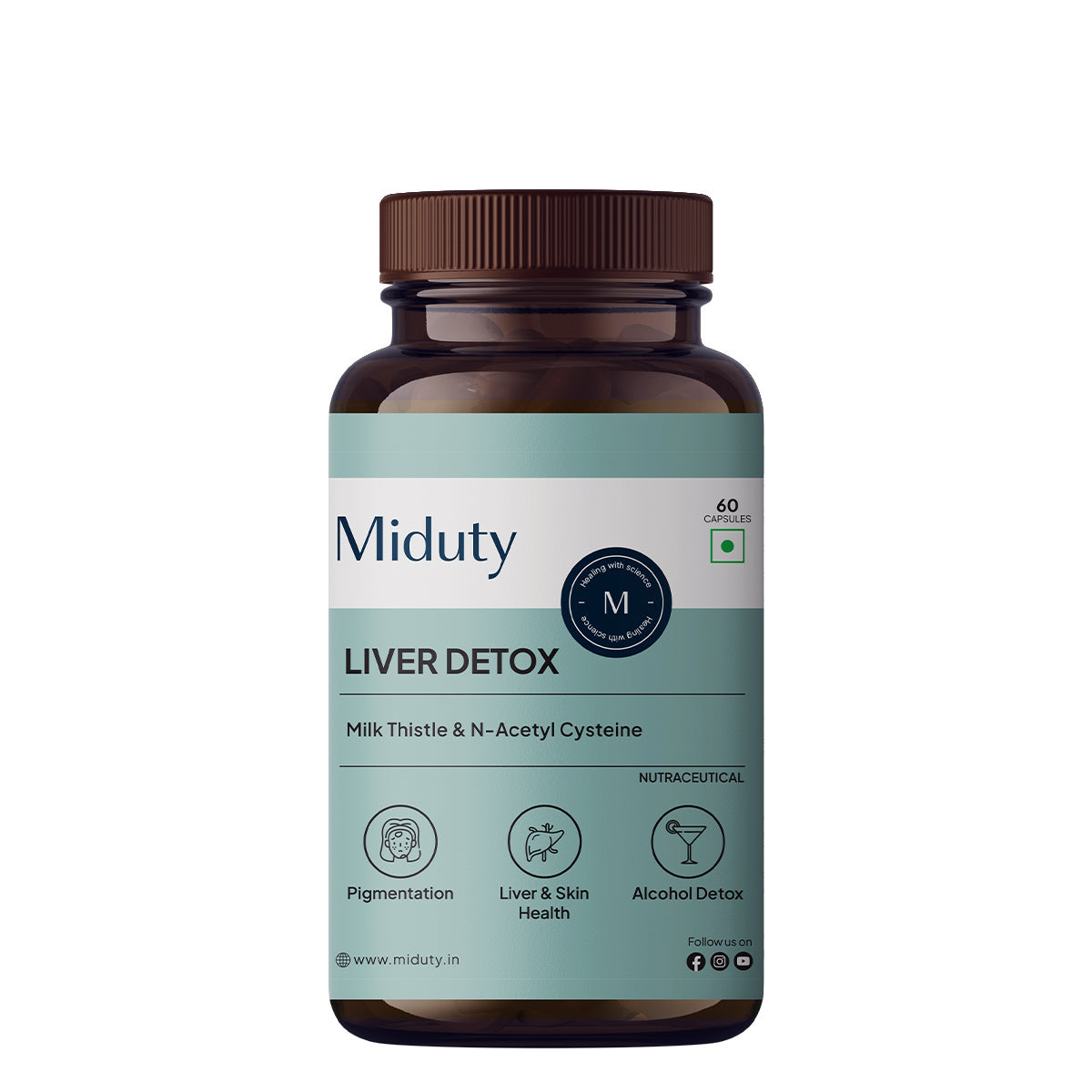
Latest Research on Betaine HCL Benefits: For Gut Health & Wellness
 Share
Share

Imagine you're at a big family feast, eagerly diving into your favourite dishes. But suddenly, you feel bloated and uncomfortable, like something's not quite right in your stomach. It's like the enjoyment of the meal just disappears, right?
It's a scenario many of us are all too familiar with. Now, what if I tell you there's a lesser-known hero in the world of nutrition that could turn this situation around? It may not be a household name, but it's gaining attention for its incredible gut-supporting powers.
You know what it is? It's Betaine HCL.
In this blog, I am going to take you on a journey deep into the science behind Betaine HCL, uncovering its secrets and the remarkable positive effects it can bring to your body.
Chapter 1: Really it's Betaine HCL!!
Betaine HCL, also known as trimethylglycine hydrochloride, is a compound that occurs naturally in various foods like beets, and spinach. It's a derivative of the amino acid glycine and has been used for decades to treat digestive issues, particularly those related to low stomach acid levels.
If you really want to understand howBetaien Hclworks and what are the potential betaine HCL benefits, we must first grasp the crucial role of stomach acid in the digestive process.
Chapter 2: The Role of Stomach Acid In Digestion
Stomach acid, primarily composed of hydrochloric acid (HCL), that plays several vital roles:
Digestion of Proteins:
Betaine HCL benefits by activating pepsin, an enzyme that breaks down proteins into smaller, more digestible molecules.
Killing Pathogens:
The acidic environment in the stomach helps kill harmful bacteria and parasites present in food, safeguarding our keeps the gut healthy.
Absorption of Nutrients:
Proper acidic environment is essential for the absorption of various nutrients, including calcium, magnesium, and vitamin B12.
Chapter 3: The Connection between Low Stomach Acid + Digestive Issues
We can regard low stomach acid, a condition which can lead to a range of digestive issues, such as bloating, indigestion, heartburn, and nutrient deficiencies. It can also create an environment in which harmful bacteria thrive, potentially leading to more severe gastrointestinal problems.
Chapter 4: Antacids - The cause behind Gut Issues!!
Antacids work by neutralizing stomach acid, which reduces the overall acidity of the stomach. As a result, the production of betaine HCL, which contributes to stomach acidity, may decrease.
Betaine HCL benefits by helping in the proper digestion of food, particularly proteins. When stomach acid levels drop due to antacid use, the digestive process becomes less efficient thus leading to gastrointestinal discomfort, including bloating and gas.
Adequate stomach acid is crucial for the absorption of certain nutrients, including calcium, iron, and vitamin B12. Lower stomach acid levels, due to higher intake of Antacids can hinder the absorption of nutrients, potentially leading to deficiencies.
Stomach acid serves as a barrier against harmful bacteria and pathogens that may be present in ingested food. Reduced stomach acid levels can increase the risk of bacterial infections in the gastrointestinal tract.
Chapter 5: Foods Rich in Betaine HCL
Including Betaine HCL rich foods in your diet can help increase your betaine HCL intake. Here are some natural sources of betaine HCL:

- Beets
- Spinach
- Quinoa
- Broccoli
- Sweet Potatoes
- Brussels Sprouts
- Pumpkin
- Salmon
Chapter 6: Lifestyle factors affecting Stomach Acid Production
People also make a note of it that certain dietary and lifestyle factors can affect stomach acid production. Hence to ensure healthy levels of Stomach Acid (Including Betaine HCL) consider the guidelines I have mentioned for you!
Limit Unhealthy Foods:
Highly processed, sugary, canned, frozen foods etc. may contribute to digestive issues over time. Reducing or eliminating them from your diet and adding food and supplements can promote overall digestive health.Switch to homemade meals with fresh ingredients and healthy oils to avoid the drawbacks of eating out, such as unhealthy ingredients and potential stomach issues.
Moderate Alcohol Consumption:
Excessive alcohol consumption can irritate the stomach lining and potentially disrupt stomach acid levels. Limit alcohol intake to promote proper digestion.
Reduce Stress:
Chronic stress can negatively impact digestion, potentially leading to low stomach acid. Stress management techniques, such as mindfulness and relaxation exercises, may be helpful.

Avoid Overeating:
Eating large meals can put extra strain on the stomach and potentially affect stomach acid levels. Opt for smaller, balanced meals to support digestion.
Limit Caffeine:
Excessive caffeine consumption can stimulate stomach acid production but consuming it in moderation is usually not problematic for most individuals.
Avoid Smoking:
Smoking can contribute to acid reflux and affect stomach acid levels. Quitting smoking can improve overall digestive health.
Limit Spicy and Highly Acidic Foods:
Spicy foods and very acidic foods can irritate the stomach lining in some individuals. Reducing these foods may help maintain stomach acid balance.
Chapter 7: Latest Research- Benefits of Betaine HCL
Now, let's dive into the exciting part – how Betaine HCL can positively impact your Gut health and what are major areas where betaine hcl benefits in.
Enhancing Stomach Acid Levels:
Betaine Hydrochloride acid works as a natural supplement to increase stomach acid levels. So, when taken before meals, it provides the necessary boost to help with digestion, particularly in individuals with low stomach acid production. This enhancement in creating an acidic environment aids in the breakdown of food, making it easier for your body to extract essential nutrients.
Improving Nutrient Absorption:
As mentioned earlier, proper stomach acid is crucial for the absorption of vital nutrients. By ensuring that the stomach environment is adequately acidic, HCL supplement benefits by helping your body absorb essential vitamins and minerals more effectively. This can have a profound impact on your overall health, including improved energy levels and enhanced immune function.
Alleviating Digestive Discomfort:
If you suffer from frequent bloating, gas or indigestion, Betaine HCL may offer much-needed relief. By promoting better digestion, it can reduce the discomfort and inconvenience associated with these common digestive problems. Plus, improved digestion can lead to better overall well-being and a more enjoyable dining experience.
Support for Gastroesophageal Reflux Disease (GERD):
GERD is a chronic condition associated with frequent acid reflux and heartburn. Contrary to common belief, GERD is not always caused by excess stomach acid. In some cases, it can be due to insufficient acid, using Betaine HCL benefits largely in such cases.
Gut Microbiome Balance:
Maintaining a healthy gut microbiome is crucial for overall gut health. The acidic environment created by Betaine Hydrochloride benefits by controlling the growth of harmful bacteria and parasites in the stomach, contributing to a balanced gut microbiome.

Absorption of Fat-Soluble Vitamins:
Fat-soluble vitamins like A, D, E, and K require sufficient stomach acid for absorption. Betaine HCL supports the absorption of fat-soluble vitamins, contributing to overall health, including immune function, bone health, and skin health.
Maintains Mucosal Integrity:
Adequate stomach acid contributes to the maintenance of the mucosal lining of the stomach and intestines. Betaine HCL benefits by supporting the health and integrity of the mucosal lining in the digestive tract, reducing the risk of damage and inflammation.
Support for Individuals Without a Gallbladder:
Betaine HCL formulations can be tailored to address the digestive and absorption issues faced by people who have had their gallbladders removed. This can help prevent bad bacterial overgrowth and autoimmune reactions.
Maintenance of Optimal pH Levels:
Betaine HCL helps maintain the acidic pH in the stomach, which is necessary for activating digestive enzymes and ensuring efficient digestion of various food components.

Protection Against Gastric Ulcers:
Betaine HCL, when combined with pepsin, is used to help protect against drug or stress-induced gastric ulcer growth, potentially preventing or managing gastric ulcers.
Chapter 8: Why Choose Miduty's Betaine HCL?
Dietary recommendations can vary depending on individual health conditions and sensitivities. Hence, including supplements in your daily routine can provide a good boost in proper formation of the stomach acid required for the proper digestion of the food.
Taking Miduty's Betaine HCL + Pepsin supplement offers several advantages and differences for individuals seeking relief from digestive discomfort.
- It not only provides the necessary stomach acid (betaine HCL) but also includes pepsin, an enzyme that aids in protein digestion.
- The inclusion of pepsin and gentian root in Miduty's HCL supplement benefits by addressing inflammatory conditions in the liver and stomach.
- Miduty's Betaine HCL benefits are described as promoting the actions of various digestive enzymes, including bromelain, lipase, amylase, and protease. These enzymes are vital for breaking down different types of food components, which can support more effective digestion.
- Miduty's formulation is designed to address the specific digestion and absorption challenges faced by individuals without a gallbladder. This targeted approach can help prevent bad bacterial overgrowth and autoimmune reactions while aiding in digestion function.
- Miduty's Betaine HCL is marketed as a solution for a range of digestive discomforts, including gas, bloating, constipation, and acidity. It positions itself as a natural alternative to antacids, addressing the root cause of these issues by increasing stomach acid levels.
Chapter 9: To Conclude
Betaine HCL is a natural supplement with scientifically supported benefits for promoting a healthy gut. Betaine HCL benefits by enhancing nutrient absorption, improving protein digestion, alleviating bloating and indigestion, support GERD management, and contribute to gut microbiome balance make it a valuable tool in digestive health.
As our understanding of gut health continues to evolve, Betaine HCL stands as a promising option for those seeking natural ways to support and optimize their digestive system.
It's important to note that symptoms ofbetaine HCL deficiency can vary widely and may include indigestion, acid reflux, nutrient deficiencies, and digestive discomfort. If you suspect a deficiency, it's advisable to consult our healthcare professional for proper evaluation and guidance on addressing the underlying causes at 86990-86991.
When used responsibly and in conjunction with a holistic approach to wellness, Betaine HCL can play a role in promoting better gut health and overall well-being.



